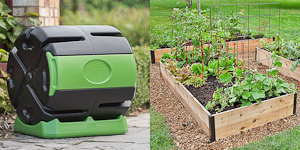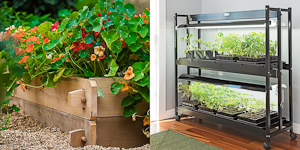- Home
- Garden Pests
- Neem Oil
Neem Oil
Neem oil is extracted from the seeds of Azadirachta indica, an evergreen tree native to India. It was used in traditional Ayurvedic medicine to treat a variety of external skin conditions, but its primary use worldwide is now as an organic pesticide and insect repellent. Neem’s great effectiveness as an organic pest control make it a prized agricultural cash crop that is grown throughout the tropics.
Undiluted, it is dark red, very bitter, and very stinky, but most neem sold in garden centers and home improvement stores are diluted blends which minimize its less pleasant aspects.
Neem is an effective organic pesticide against many insects as well as a variety of fungal and viral plant diseases. It is safe to use around pets and will not harm beneficial insects including ladybugs and honeybees, because it works in a fundamentally different way than most chemical pesticides.
Neem works in three ways:
- It acts as an anti-feedant because it tastes so bad. Some insects will would rather starve than eat it.
- It contains many complex compounds which act as hormone disruptors in the insects which ingest it, namely the chewing and sucking insects (see the chart below). It usually does not kill the insect outright, but causes it to lose its survival behaviors – the insect may stop eating, mating, laying eggs, or flying. Once the reproductive cycle is interrupted, the insect’s life cycle is broken, and the population soon dies out.
- It suffocates the insect. This effect occurs when you spray neem oil directly on the insect’s body (it works well this way on aphids). Unfortunately as an oil, it will also suffocate the beneficial insects, so try not to douse your ladybugs, too.
Because honeybees, ladybugs, parasitic wasps and other beneficial insects do not eat leaves or suck sap from within the plant, they do not ingest the neem and so are not affected. However, don’t spray neem oil directly onto flowers that honeybees are visiting.
As an organic pest control neem is effective against:
- Aphids
- Leafminers
- Beet armyworms
- Mealy bugs
- Beetles (including flea beetles)
- Mites
- Cabbage worms
- Moth larvae
- Caterpillars
- Nematodes
- Fungus gnats
- Thrips
- Grasshoppers
- Whiteflies
- Japanese beetles
Don’t expect neem oil to work instantly and find piles of dead bugs in the morning. Act early when you discover a problem, and give it a bit of time. Spray neem early in the morning to avoid suffocating beneficial insects, which are most active in the middle of the day. Neem is much kinder to the overall ecosystem of the garden than almost any other insecticide or repellent out there.
Neem is also a powerful antifungal and antiviral, making it also effective against the following plant diseases:
- Black Spot (Roses)
- Powdery mildew
- Anthracnose
- Rust (fungal)
Neem oil is available from Gardener's Supply using the link in the upper right of this page.
Help share the skills and spread the joy
of organic, nutrient-dense vegetable gardening, and please...
~ Like us on Facebook ~
Thank you... and have fun in your garden!
Affiliate Disclaimer
This website contains affiliate links to a few quality products I can genuinely recommend. I am here to serve you, not to sell you, and I do not write reviews for income or recommend anything I would not use myself. If you make a purchase using an affiliate link here, I may earn a commission but this will not affect your price. My participation in these programs allows me to earn money that helps support this site. If you have comments, questions or concerns about the affiliate or advertising programs, please Contact Me.Contact Us Page



